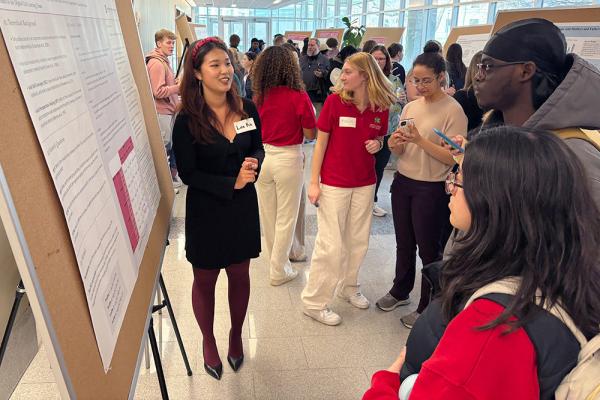Psychology undergraduates share research with Ohio State community

For people who are not fluent in American Sign Language, is the meaning of the “eat” sign easier to guess than that of related words in other languages, such as delicioso, Portuguese for “delicious”?
For his senior research thesis, psychology student Eric Bridge explored differences between how confident non-signers feel understanding ASL and their confidence in understanding unfamiliar spoken languages. Even when signs and words were comparably clear, people were “disproportionately confident” in thinking they had a better grasp of ASL.
“There’s a different general attitude about understanding ASL versus understanding spoken languages,” he said, explaining his findings.
Bridge's work was among 12 student projects recently featured at the Department of Psychology’s Undergraduate Research Colloquium, held March 24 in the Psycholgy Building lobby. For more than 22 years, the annual event has offered all department majors involved in research an opportunity to share their work with The Ohio State University community.
At this spring’s colloquium, about 100 faculty, staff and others strolled through a display of jumbo-sized posters and learned about students’ research questions, processes and findings from the 2024-2025 academic year. The voices of the undergraduate researchers and their audiences filled the space, as did the aroma of catered samosas and sliders.
Across from Bridge, Eve Saltzman presented her work on “emotional prosody recognition deficits,” which she completed with guidance from professor Mark Pitt. Existing research suggests that depressed people struggle to correctly identify emotion in facial expressions, she explained. She hypothesized that this pattern would also appear in spoken language. Her study confirmed this.
“People with depression are worse at identifying emotion based on speech,” she said.
Nearby, Allie Woodard discussed research on undergraduate evaluations of non-binary instructors. Nick Kutz presented a poster about attractiveness bias and prejudice in hiring decisions. Other student projects examined topics such as the impact of self-identified reading struggles, the reliability of fMRI signals in emotional regulation tasks, and young adults’ perceptions of parental relationships.
Studies like these are a cornerstone of the undergraduate program in the Department of Psychology, one of the largest units in the College of Arts and Sciences and at Ohio State more broadly. Of its more than 2,000 majors, hundreds enroll in upper-level research coursework every semester, said Director of Undergraduate Programs Alisa Paulsen. Many also conduct or contribute to projects of their own with the mentorship of department faculty.
This experience is key to preparing students for graduate programs and their professional lives, explained clinical psychology professor Jennifer Cheavens.
“Participating in research as an undergraduate allows students to make career and personal decisions that are informed by personal, mentored, deep learning experiences,” she said.
Most colloquium participants this year were enrolled in the department’s research thesis course and preparing to defend their projects this spring. Styled as a combined open house and academic poster session, the event was a valuable opportunity for these students to network and to hone their presentation skills—as well as a chance to share the novel and challenging research they have undertaken, Cheavens said.
“This is an opportunity to be a part of a research community, have one’s ideas challenged, and take pride in a job well-done,” she explained. “For faculty, staff, and other students, it is an opportunity to get an overview of the work that is happening throughout the year across the department and celebrate the next generation of psychological researchers.”
Colloquium presenters agreed. Lina Kim, who planned to defend her thesis in mid-April, said the event offered her good practice. Woodard—whose project encountered what she called a “manipulation failure” and “fell apart at the end”—still felt her colloquium experience was instructive.
“I got to connect with a lot of faculty,” she said. “I got a lot of advice for future directions.”
Back near the east entrance to the Psychology Building, Bridge took a brief break from explaining language perception discrepancies to share his thoughts. Although he had previously presented his work at a conference and defended his thesis, the colloquium helped him continue to practice engaging broad audiences.
“I’ve been talking pretty much the entire time,” he said.

